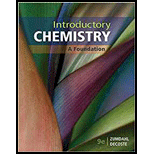
Interpretation:
One equivalent of an acid is to be defined. An equivalent of a base is to be explained. The relation between the equivalent weight of an acid or a base and the substance’s molar mass is to be explained. An example of an acid and a base that have equivalent weights equal to their molar masses is to be stated. An example of an acid and a base that have equivalent weights that are not equal to their molar masses is to be given. The normal solution of an acid or a base is to be defined. The relation between the normality of an acid or a base solution and its molarity is to be explained. An example of a solution that has equal normality and molarity, and an example of a solution that have different normality and molarity is to be stated.
Concept Introduction:
The molarity of a solution is the molar concentration of the solution; it measures the number of moles of solute dissolved in one liter of the solution. The formula for molarity is given as,
M=nV
Where,
- n represents the number of moles of the solute.
- V represents the volume of the solution.
The normality of a solution is referred as the gram equivalent weight of a solute dissolved in one liter of the solution. The normality of solution is given as:
N=neqV
Where,
- neq represents the number of equivalents of the solute.
- V represents the volume of the solution.
Want to see the full answer?
Check out a sample textbook solution
Chapter 15 Solutions
Introductory Chemistry: A Foundation
 Introductory Chemistry: A FoundationChemistryISBN:9781337399425Author:Steven S. Zumdahl, Donald J. DeCostePublisher:Cengage Learning
Introductory Chemistry: A FoundationChemistryISBN:9781337399425Author:Steven S. Zumdahl, Donald J. DeCostePublisher:Cengage Learning General, Organic, and Biological ChemistryChemistryISBN:9781285853918Author:H. Stephen StokerPublisher:Cengage Learning
General, Organic, and Biological ChemistryChemistryISBN:9781285853918Author:H. Stephen StokerPublisher:Cengage Learning World of Chemistry, 3rd editionChemistryISBN:9781133109655Author:Steven S. Zumdahl, Susan L. Zumdahl, Donald J. DeCostePublisher:Brooks / Cole / Cengage Learning
World of Chemistry, 3rd editionChemistryISBN:9781133109655Author:Steven S. Zumdahl, Susan L. Zumdahl, Donald J. DeCostePublisher:Brooks / Cole / Cengage Learning Introductory Chemistry: An Active Learning Approa...ChemistryISBN:9781305079250Author:Mark S. Cracolice, Ed PetersPublisher:Cengage Learning
Introductory Chemistry: An Active Learning Approa...ChemistryISBN:9781305079250Author:Mark S. Cracolice, Ed PetersPublisher:Cengage Learning Chemistry: The Molecular ScienceChemistryISBN:9781285199047Author:John W. Moore, Conrad L. StanitskiPublisher:Cengage Learning
Chemistry: The Molecular ScienceChemistryISBN:9781285199047Author:John W. Moore, Conrad L. StanitskiPublisher:Cengage Learning Living By Chemistry: First Edition TextbookChemistryISBN:9781559539418Author:Angelica StacyPublisher:MAC HIGHER
Living By Chemistry: First Edition TextbookChemistryISBN:9781559539418Author:Angelica StacyPublisher:MAC HIGHER





